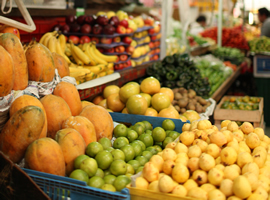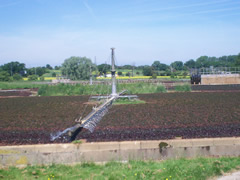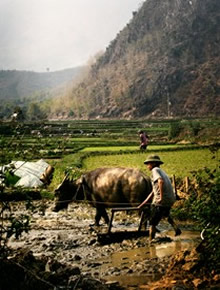Industrial Agriculture vs. Organic Farming:
Better Living through Chemistry?
By Joshua Coates

Supermarkets are the front lines in a war you may not even know is being waged. You see battle lines drawn in the aisles where there are wide expanses of conventionally grown produce, with separate smaller bins for organic produce, often at higher prices. Both sides claim to have humanity, the environment, and your health as their number one priority. Both claim to have the solution to world hunger, disease, and imminent planetary destruction. Every time you shop for groceries you are exercising your political power. What choices have you been making, and what are the consequences?

On the surface it might seem that organic food is too expensive, and that in the end there really isn’t much difference between “regular” and organic food. So why would you spend more for organic produce when money is so tight? Some would say that organic food is not worth the extra money; others would argue that industrially produced food is such a deadly threat to your health and to the environment that you can’t afford NOT to buy organic. Let’s take a closer look, shall we?
In the United States, where obesity is so widespread it has been labeled an epidemic, there are 33 million people who go without food because they cannot afford it. Not just hungry…but starving. This is nothing compared to the 800 million people that go hungry every day worldwide. There is no debate about whether starvation is a devastating problem for mankind. Forests have been decimated on a monumental scale to accommodate agricultural enterprises; the loss of biodiversity and life is incomprehensible.
The water we drink is polluted with toxic chemicals, as is the air we breathe. It is pretty clear to most people at this point that the environment we depend on for survival is being destroyed. Every year cancer and other diseases related to diet and environmental factors claim substantially more lives than the year before. Among reasonable, educated adults, there is no dispute over the existence and proliferation of “industrial-age” illness. Although it may not be immediately apparent, all of these things are results of agricultural practices. They are, at least in part, results of the choices you have made when buying food.

The main question is this: who or what has caused these problems? We also must ask, how can we address and remedy the situation? While the problems may have originated from actions that you did not personally take, the solution is at least in part dependent on your individual actions and choices. At the core of this debate is a polarization between conventional (industrial) and organic farming practices.
Advocates of industrial agriculture would say that the technologies of bioengineering, chemical fertilizers, and pesticides can produce more food more cheaply and solve the world’s hunger problems indefinitely. Deborah Miller, in her article "High-Yield, Industrial Agriculture Protects Biodiversity," claims that “the more yield we get per acre of land the less nature has to be destroyed to do that ...it's simple arithmetic. The more people there are, the more forest has to be cleared to feed them, and the only way to offset that is to have more yield per acre." She goes on to point out that “without higher yields, peasant farmers will destroy the wildlands and species to keep their children from starving.”
The major selling point of agribusiness is that industrial farms have higher yields. Higher yields mean more food. More food means less hunger. It seems pretty clear that industrial methods could hold the key to ending world hunger. In his article, “Ethical Arguments Relative to the Use of GM Crops,” Albert Weale insists that bioengineered crops consistently produce higher yields and higher profits for farmers in developing countries. He explains that there is a “moral imperative” to bestow this technology to developing countries plagued by starvation.
This is one of industrial farming’s main arguments: that cheaper production costs and higher yields are proof that their methods are more efficient than the alternatives, and that as a result the technology MUST be shared to end world hunger. While on the supermarket shelves conventionally grown and genetically engineered food may be somewhat cheaper, the real costs are often hidden. It costs tens of millions of dollars and takes many years to develop one genetically modified plant variety. This money would be spent far more productively on organic agricultural education, research and extension in the areas where we need to overcome hunger and poverty.

Those who favor organic farming methods would tell you that the problem does not lie with a shortage of food but an imbalanced distribution of the food that exists. They might also say that feeding the starving with chemical-drenched crops is essentially genocide. In his book Fatal Harvest: The Tragedy of Industrial Agriculture, Andrew Kimbrell explains how industrial farming has systematically spread across the globe, forcing people off their land and turning their farmland into huge monocultures of cash crops to be exported. Left landless, they cannot grow food for themselves, and are forced into cities. There is no local produce for them to buy, since the local land is being farmed by multinational corporations for export of luxury crops and livestock to wealthier countries. Having to subside on meager wages, they cannot afford the food that is available because it has to be imported at exorbitant rates. Unable to provide for their families and seeing no hope on the horizon, many farmers in developing nations commit suicide every year.
By luxury crops, I mean the pineapples you enjoy from Costa Rica, the beef in your fast food burgers, and the sugar beets, soy beans, and wheat that are in practically every package of processed food you have ever purchased. The farmland of the world and its people are exploited to produce the things you have grown accustomed to consuming. We have all grown accustomed to this, and it’s time we began to understand the connection between us and our food, the connection between our food and where it comes from, and the connection between our actions and their consequences for the rest of the world.
Did you like the article? Subscribe here to our New Article Email Alert or RSS feeds.
Sharing is caring! Don't forget to share the love, and keep the conversation going by leaving a comment below:
Advertisement
